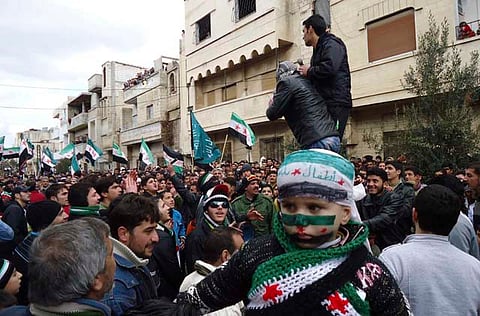Arab Spring: Painful progress
Despite the ouster of some autocratic regimes, the path to democracy seems strewn with thorns

Nearly a year after uprisings first erupted across the Arab world, it is still unclear whether they will produce real democracy, or an era of instability and unending street politics.
Tunisia, which was the inspiration behind other Arab states rising up against autocratic regimes, is also the first to reap the fruits of its revolution. It also suffered the least in terms of loss of life and property. The North African Arab country is now on the path towards establishing a real democratic state thanks to its adoption of a clear roadmap charting its future. All political groups, Islamic and liberal, agreed on a peaceful approach.
Millions of frustrated youth — in Egypt, Yemen, Libya and Syria — were inspired by Tunisia's revolution to rise up against their autocratic regimes. Countries such as Bahrain, Oman, Jordan, Morocco and Algeria also saw waves of protests demanding reforms, but did not see calls for regime change.
In Egypt, millions of youth engaged in anti-government demonstrations that turned into a sweeping public revolution and finally managed to end Hosni Mubarak's 30-year rule in just 18 days.
Yet, a year after this revolution, uncertainty engulfs the Egyptian political scene amid calls by revolutionary forces to carry on with their struggle in order to compel the military council to hand over power to an elected civilian government.
Yemen is still at a critical juncture nearly a year after the uprising against outgoing president Ali Abdullah Saleh's 33-year rule. However, the political situation is expected to see improvement. Saleh's departure to the US for medical treatment will pave the way for a transition of power.
In Libya, three months after the death of their leader Muammar Gaddafi, tensions remain high in several Libyan cities, especially with the proliferation of weapons in the streets of Tripoli and other Libyan cities which are still under the control of revolutionaries.
Meanwhile, the Syrian scene is getting more complicated and no one can predict what will happen.
Different demands
Arab countries such as Algeria, Morocco and Jordan have also witnessed a wave of protests demanding political and economic reforms, not regime change.
In Algeria, there is almost a state of accordance between political parties and people on the one hand, and the government and the army on the other one.
From republican countries to monarchies, the political situation seems less challenging.
In Morocco, for example, the political scene seems quiet after King Mohammad VI appointed Abdelilah Benkirane, the leader of the Justice and Development Party, as Morocco's new prime minister, in response to protests.
Obviously, the Moroccan people are carefully monitoring the political scene in their country to see whether the new government can deal with major challenges, such as high prices, unemployment and low wages, as well as the authority's response to their demands for social justice, freedom and human dignity.
Also, among the Moroccan people's demands is limiting the king's powers, as well as the transition of power from a single leader to state institutions governed by law, order and constitution.
Jordan is another example of an Arab monarchy where people engaged in demonstrations demanding reforms and transforming the Hashemite kingdom into a constitutional monarchy, as well as fighting corruption. But, Jordan is now in an unenviable situation because of the deteriorating situation in neighbouring Syria.
Overall, the political situation in the Gulf now seems more stable after order was restored in Oman and Bahrain where Peninsula Shield forces managed to maintain order. Also, the Bahraini government has positively responded to international demands for an investigation into action against protesters, while reform is on track.
In Oman, executive procedures and measures have convinced protesters to return home as conditions can be improved without demonstrations and riots.
All these reasons seem convincing for Gulf citizens not to engage in Arab Spring revolutions. Yet, these reasons are not the ones that have contributed to the stability in the Gulf Cooperation Council (GCC) countries. First, the Gulf people are convinced that their ruling regimes never carried out barbaric acts against them, nor have the GCC security services and armies carried out repressive practices. Another reason is that the GCC people are in harmony with their rules and in contact with them through traditional channels of communication. They share and exchange views and opinions about national issues and daily life affairs.
Also, GCC citizens enjoy social stability and good living conditions, thus making them keen on maintaining the stability of their societies, even if they lack political participation and democracy in modern or western forms.
The fear of foreign interference is among the reasons GCC citizens are satisfied with their regimes. The Iranian intervention, which takes an ethnic dimension, and any other forms of foreign interference, are totally rejected.
The fourth reason is represented in the people's fear of violence and destruction that accompanied change in some Arab societies.
Dr Khalifa Rashid Al Shaali is an Emirati writer who specialises in legal affairs.



